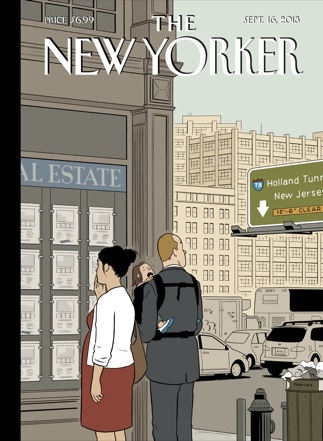 September 16, 2013: “By Fire” by Tahar Ben Jelloun
September 16, 2013: “By Fire” by Tahar Ben Jelloun
This isn’t a short story so much as a barely fictionalized account of actual events in Tunisia, and as such it is more a political tract than a work of literature.
Here’s the story: Mohamed can’t find work. The police and governing authorities are universally corrupt and make his life impossible. In frustration, Mohamed self-immolates, prompting an outpouring of resentment and the downfall of government.
I’m sympathetic with the Mohameds of the Arab world, but this isn’t worthy of the fiction section of The New Yorker.

I agree. Mohammed felt very much like a stock character moving from one humiliation to the next. We’re told that he studied history at the university but his thoughts and reactions don’t seem informed by this. Wouldn’t a history major be more aware of the potential political ramifications of his self-immolation? Mohammed seems to be acting out of personal pique rather than in defiance of the regime. I suspect that there is a lot of brave, exciting fiction being written in the Middle East right now but this story isn’t part of that.
Can you help me and tell me what was the causes that lead Mohammed put himself into fire?
I agree also. I was surprised to see this in the Fiction section of the New Yorker. The author obviously cares about the subject and wants to involve the reader but the “story” (fiction? really?) and style (flat) accomplish the opposite. The author wants the protagonist to represent many and ends up representing no one.
I’m a huge fan of the story, and dissent utterly from this flow of negative comment, much of which seems unfair and even wrong. For example, Jeanette criticizes “the author”, but since this is a translated piece the author (as opposed to the story) can’t fairly be criticized without reading the original work.
The story is a vivid and exciting fictionalised account of the self-immolation of Mohamed Bouazizi, an important historical event, and lies squarely within the genre of political fiction.
I am clueless as to what Cliff means by “barely” as in “barely fictionalised”. If he means that the details of the story match the details of the historical event, that is surely a strength of the story, rather than a weakness.
This story left me very depressed, and knowing that it is based on reality just made it much worse. I think I’m going to cancel my subscription to The New Yorker.
Poor Mohamed. Rest in peace.